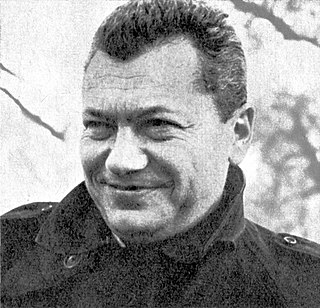Related Research Articles

Wojciech Jerzy Has was a Polish film director, screenwriter and film producer.

The Hourglass Sanatorium is a 1973 Polish surrealist film directed by Wojciech Jerzy Has, starring Jan Nowicki, Tadeusz Kondrat, Mieczysław Voit, Halina Kowalska and Gustaw Holoubek. It is also known as The Sandglass in English-speaking countries. The story follows a young Jewish man who visits his father in a mystical sanatorium where time does not behave normally. The film is an adaptation of Bruno Schulz's story collection Sanatorium Under the Sign of the Hourglass. It won the Jury Prize at the 1973 Cannes Film Festival.
The Saragossa Manuscript is a 1965 Polish film directed by Wojciech Has, based on the 1815 novel The Manuscript Found in Saragossa by Jan Potocki. Set primarily in Spain, it tells a frame story containing gothic, picaresque and erotic elements. In a deserted house during the Napoleonic Wars, two officers from opposing sides find a manuscript, which tells the tale of the Spanish officer's grandfather, Alphonso van Worden. Van Worden travelled in the region many years before, being plagued by evil spirits, and meeting such figures as a Qabalist, a sultan and a Romani person, who tell him further stories, many of which intertwine and interrelate with one another.
The Generation of Columbuses is a term denoting the generation of Poles who were born soon after Poland regained its independence in 1918, and whose adolescence was marked by World War II.

Hydrozagadka is a Polish superhero comedy film. During a summer heat wave, all the water in Warsaw is puzzlingly disappearing. Scientists secretly call upon As (Ace), a superhero who passes his days living as a mild-mannered engineer, to try to solve the mystery. It turns out that a mysterious Maharaja is in league with Doctor Spot to steal Poland's water and take it to the Maharaja's country.

How I Unleashed World War II is a Polish feature film made in 1969, based on Kazimierz Sławiński's novel "Przygody kanoniera Dolasa". It was shot in Sochi, Baku, Poświętne and Łódź, among other places.
Ballada o Januszku was a Polish mini series aired from 1988–1989. It was first broadcast on November 8, 1988. The series was based on the book written by Sławomir Łubiński.

Battle of Warsaw 1920 is a Polish historical film directed by Jerzy Hoffman depicting the events of the Battle of Warsaw (1920) of the Polish–Soviet War. It was released in September 2011. It was filmed in 3D using the Fusion Camera System and is one of the most expensive movies in the history of cinema in Poland.

Republic of Hope is a 1988 Polish historical film created by Zbigniew Kuźmiński and written by Kuźmiński and Kazimierz Radowicz. Film is based on the miniseries The Republic of Ostrów which premiered on TVP on June 4, 1986.
Warsaw Premiere is a 1951 Polish historical film directed by Jan Rybkowski and starring Jan Koecher, Barbara Kostrzewska and Jerzy Duszyński. The film's art direction was by Roman Mann. The film portrays the life of the Polish composer Stanisław Moniuszko, particularly focusing on the composition of his 1848 opera Halka. The film was the first Polish costume film made since the Second World War, and was stylistically similar to historical biopics in other Eastern Bloc countries such as Rimsky-Korsakov (1952).
Salto is a 1965 Polish drama film written and directed by Tadeusz Konwicki. It was released on 11 June 1965 in Poland. The director of photography is Kurt Weber and the music is by Wojciech Kilar. The title can be translated as "somersault" in English, or it can be seen as a reference to a rhythmic dance movement. The film received an Honorary Diploma at the Edinburgh International Film Festival, 1967.

George the Hedgehog is a 2011 Polish animated black comedy film directed by Wojciech Wawszczyk, Jakub Tarkowski and Tomasz Leśniak. Based on the Jeż Jerzy comic books, it tells the story of two neo-Nazis and a mad scientist creating a clone of the title character in an attempt to defeat him.
The Noose is a Polish film released in 1958, directed by Wojciech Jerzy Has, and starring Gustaw Holoubek. The film is an adaptation of a short story by Marek Hłasko, and follows a day in the life of an alcoholic.

Memoirs of a Sinner is a 1986 Polish film directed by Wojciech Jerzy Has, starring Piotr Bajor. The film is an adaptation of The Private Memoirs and Confessions of a Justified Sinner (1824) and tells the tale of the protagonist Robert and his doppelganger.

An Uneventful Story is a 1983 Polish film directed by Wojciech Jerzy Has, starring Gustaw Holoubek. The film is an adaptation of a short story by Anton Chekhov and tells the story of a professor of medicine who begins an affair with a young pupil.
Andrzej Tylczyński was a Polish songwriter, journalist, writer, lyricist, and satirist.

Leopold Borkowski was a Polish actor.

The Służew Old Cemetery is a Roman Catholic cemetery in the area of Stary Służew in the Ursynów district of Warsaw, Poland.
References
- ↑ New York Times - Movies | Pismak
- ↑ Pismak - FilmPolski.pl
- ↑ "FilmPolski.pl". FilmPolski (in Polish). Retrieved 2023-07-28.